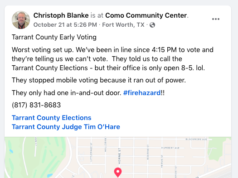It’s au revoir for Tarrant County Homeless Coalition director Cindy Crain, who took over as president and CEO of Metro Dallas Homeless Alliance on Feb. 1. After a three-month nationwide search by the alliance, board chair Britton Banowsky said, Crain’s accomplishments at TCHC were unmatched by any of the hundreds of applicants.
“She has a high level of expertise in a highly technical field,” Banowsky told Static. “[After seeing] the solid foundation she gave [TCHC], we felt that would translate well with Dallas.”
During Crain’s seven-year tenure, TCHC grew from an agency with one staff member and a $100,000 annual budget to a $1.4 million agency with nine staffers, providing extensive services to the homeless.
“I know the folks there are losing a valued asset, but she is going to be influential across the entire region,” Banowsky said.
The overall homeless population in Fort Worth is still growing, although the ranks of chronically homeless have begun to shrink. Crain said the city, charitable foundations, and other nonprofits are far from resolving serious issues contributing to the problem. And then there are agencies like the Fort Worth Transit Authority that are moving backward.
The T announced last fall that it will end a $300,000 program that provides free bus passes to local nonprofit groups. The passes help poor people, including the homeless, get to job interviews and to work and cut down on concentrations of homeless people loitering in the same spots all day, causing problems for businesses and other residents.
“We have to come up with a solution for how we are going to prevent the loss of 50,000 bus passes to people on East Lancaster [Avenue], and that clock is ticking,” Crain said. The loss could “potentially counter all the great effort that has been done so far.”
Crain had planned to revisit an issue this year that is at the heart of the homelessness: evictions. In their worst form, mass evictions can put hundreds of financially vulnerable families on the streets with no notice. One recent eviction in the Riverside area also left dozens of cats and dogs homeless (“Get Out,” Oct. 8, 2014).
Evictions in Fort Worth are steadily climbing, Crain said, because the supply of affordable housing isn’t growing along with the population.
“Anecdotally, if I’m a landlord and my tenant is one day late [with the rent], I’ve got 15 applications to replace that person,” she said. “The landlord in that situation is going to evict that person.”
Crain said some city council members and local foundations are finally beginning to focus on providing permanent supportive and affordable housing at the levels needed to stem the tide of homelessness. “Developers, private-sector dollars, the availability of tax credits have to come together. We’re behind the curve on that,” she said. “We need the private philanthropic sector to put money into housing as opposed to more emergency services.”
But these are now issues for her successor. Crain said she will miss the people and organizations with whom she’s forged relationships, especially her staff who have become “like family.”
“I heard some people say ‘Oh, you can’t be replaced,’ ” she said. “Well, everyone is replaceable. Dallas is a bigger pot. It’ll be an exciting challenge.”
Despite the longer commute to her new job, Crain has no plans to move from Weatherford.
“I’m a rodeo gal,” she said, “and you’re not going to take Fort Worth and the cowgirl out of me.”












